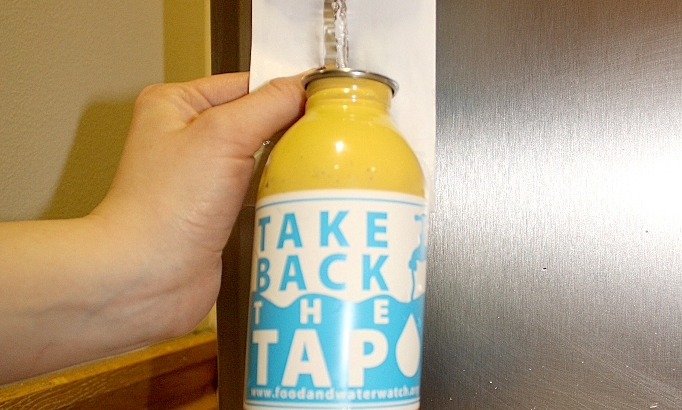Photo by Nicole Maselli ‘14
Students at Lafayette are working to increase environmentally friendly measures at the college by advocating for eliminating or limiting disposable water bottle usage.
Rebecca Citrin ‘14 and Julia Kripas ‘15, working with the nationwide organization Food and Water Watch, are bringing “Take Back the Tap” to Lafayette, which supports student movements to ban water bottle use on campus.
Their initiative is to raise awareness of the negative effects of plastic water bottle use and to promote a reduction in the use of bottled water, then judge the reaction and support of the student body to see “if it’s a possibility that the student body is open to banning water [bottles],” Citrin said.
Reducing or even banning bottled water on campus is “saving money, saving yourself, and helping the environment as well,” Kripas, who is the president of Lafayette Environment Awareness and Protection (LEAP), said.
Citrin was inspired when a representative from Food and Water Watch came to Lafayette last semester and immediately seized the opportunity to promote sustainable solutions. She and those working with her are joining a movement that began in 2009 and has already worked to ban plastic water bottles in 56 schools across the US.
Since then, Citrin has put together a group of strong leaders, received support from the Watch, and collaborated with LEAP. The fully student-driven movement aims to increase the amount of water fountains and water refilling stations around campus, specifically in the gym, library, and Lower Farinon.
Citrin pointed out that these additions could be easily incorporated into the dining services renovations planned for this coming summer.
The initiative’s ultimate goal is to have disposable water bottles banned on campus, and reusable water bottles take their place. However, they are wary that a campus-wide consensus might not be possible.
“It’s always possible that once we start promoting it, there’s a ton of people who are really opposed to it,” Citrin said. “We won’t know until we get the word out there.”
Thus, they plan to begin putting up educational flyers and holding events after spring break.
“We think that we can educate the community and really just tell them some interesting things about water and the negative effects of it so hopefully they’ll join and support us,” Citrin said.
“I don’t want to come across scaring people, like we’re gonna take bottled water away tomorrow and you have to deal with it,” Kripas said.
Bon Appetit General Manager Joel Blice is open to the idea of reducing the use of water bottles and believes the changes should be a collaborative effort between dining services and all parties involved.
Muhlenberg College has already reduced their water bottle usage 92 percent in one year. In Pennsylvania, Chatham University and Franklin & Marshall College have completely banned the sale of water bottles on campus, according to the Food and Water Watch website. In New Jersey, Princeton University is in the process of reducing their water bottles.
“I think if we get the support of the campus and everyone on board with this, I think it would definitely open the doors for a lot of other sustainability initiatives,” Citrin said.


























































































































Michael McGuinness • Mar 17, 2014 at 12:43 pm
Bottled vs tap water? This presents a great opportunity for a cross disciplinary detailed look into the origin,cost,necessity,and potential health risks of the chemical additives to the Easton/Lafayette municipal tap water.